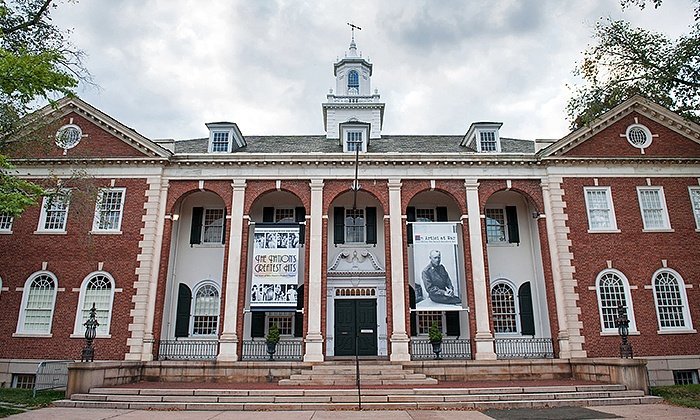What’s on view at the New Haven Museum?
Exhibitions including “Profiles,” “FACTORY” and “Signs of the Time” showcase New Haven’s history.

Wikimedia Commons
From celebrating the works of the first woman to receive a master’s degree from the School of Art to exploring the storied history of an abandoned clock factory turned nightclub, the New Haven Museum’s current exhibitions document the vibrant and varied history of New Haven.
The exhibition “FACTORY” chronicles the post-industrial history of the building that once housed a world-renowned brass clock company, while “Portraits: Ruth McIntosh Cogswell and Dorothy Cogswell” showcases the art and work of a mother and daughter from the 20th century. These two exhibits are expected to be on display until Dec. 30.
“My favorite [exhibition] at the moment is ‘FACTORY’ because it explores how artists in the city took a vacant factory space and repurposed it into a creative collective … For decades the space was the site for music, performances, academic discourse and an LGBTQ+ subversive space,” Eve Galanis, an educator and researcher at the New Haven Museum, wrote to the News.
New Haven Clock Company Factory was founded in 1853 and produced millions of watches until its demise in 1959. The abandoned building became a refuge for artists seeking space, including hosting the Papier Mache Video Institute’s activist art, the School of Architecture’s “Sex Ball” and drag shows. The space was also home to a pioneering artistic community, which coexisted alongside a series of music and adult entertainment clubs that featured a diverse music scene and performance spaces.
In 2018, a developer proposed a plan to create live-work lofts for artists in the building. However, the city refused to allow residential housing in the industrial zone, hindering these efforts.
“I jumped at the opportunity to speak, document and share these histories, as often underground history falls through the cracks and has rarely been deemed ‘museum-worthy’ in the past,” Jason Bischoff-Wurstle, director of photo archives at the New Haven Museum and curator of the exhibition, wrote to the News. “This exhibit is a testament to years of underground energy and ingenuity and the years of all of our lives when nothing was impossible.”
The exhibit, “Portraits: Ruth McIntosh Cogswell and Dorothy Cogswell” also explores the origins of the contemporary New Haven arts community, encouraging visitors to consider the role that 20th-century women played in establishing its legacy. It documents the lives of a mother and daughter who both studied and taught art in the New Haven community, featuring photographs, watercolors, pencil drawings and silhouettes by the two women.
Mary Christ, former collections manager of the New Haven Museum and current campus art collection registrar at Yale, curated “Profiles” alongside Katy Rosenthal, a former intern at the Museum.
“Ruth [McIntosh Cogswell] was a very skilled silhouette artist, and she created hundreds of silhouettes of New Haveners and people from other places in Connecticut,” Christ wrote to the News. “Visitors can view her original silhouettes in the exhibit and delight in the way a simple, solid profile of a subject can capture personality and experiences.”
Hung around the upstairs rotunda of the museum, and also curated by Christ, the exhibit, “Signs of the Time,” features 19th- and 20th-century signs from local businesses, including the now-extinct Yale Brewing Company.
Another ongoing exhibit at the museum, “Form and Function: Decorative Arts in the Exhibition,” showcases an assortment of its historic design and decorative arts holdings. Objects ranging from baroque furniture to mid-century modern designs are categorized into thematic groups: politics, childhood, business and eclectic homes.
“From Clocks to Lollipops: Made in New Haven” also surveys New Haven’s corporate history. Curated by museum consultant Elizabeth Pratt Fox and featuring over 100 advertisements, trade cards, photographs and other objects, this exhibition explores the local production of consumer goods since New Haven’s colonial days.
Alongside these featured exhibitions, the museum’s permanent collection features a wide array of art, memorabilia and artifacts from New Haven’s colonial to contemporary periods. The museum also hosts a variety of events aimed at encouraging public engagement in the city’s ongoing historical record.
Cynthia Riccio, who recently joined the museum staff as the director of programs and planning, was drawn to the museum’s connections and work within the New Haven community. She said she plans to further these efforts in her role.
“We have a program on December 3, ‘A History of Victorian Dolls’ House,’ followed by a tea reception and a special tour of the museum’s Levy Dolls’ House. We are once again partnering with the Peabody on a program for MLK Day on January 14 and 15 and look for programs in February with Connecticut Explored, The Yale & Slavery Project, Lunarfest with Yale-China and a book talk by Eric Jay Dolan, author of Privateering in the American Revolution,” Riccio wrote to the News.
The Museum is open to the public Wednesday through Friday from 10 a.m. to 5 p.m. and on Saturdays from 12 to 5 p.m.







